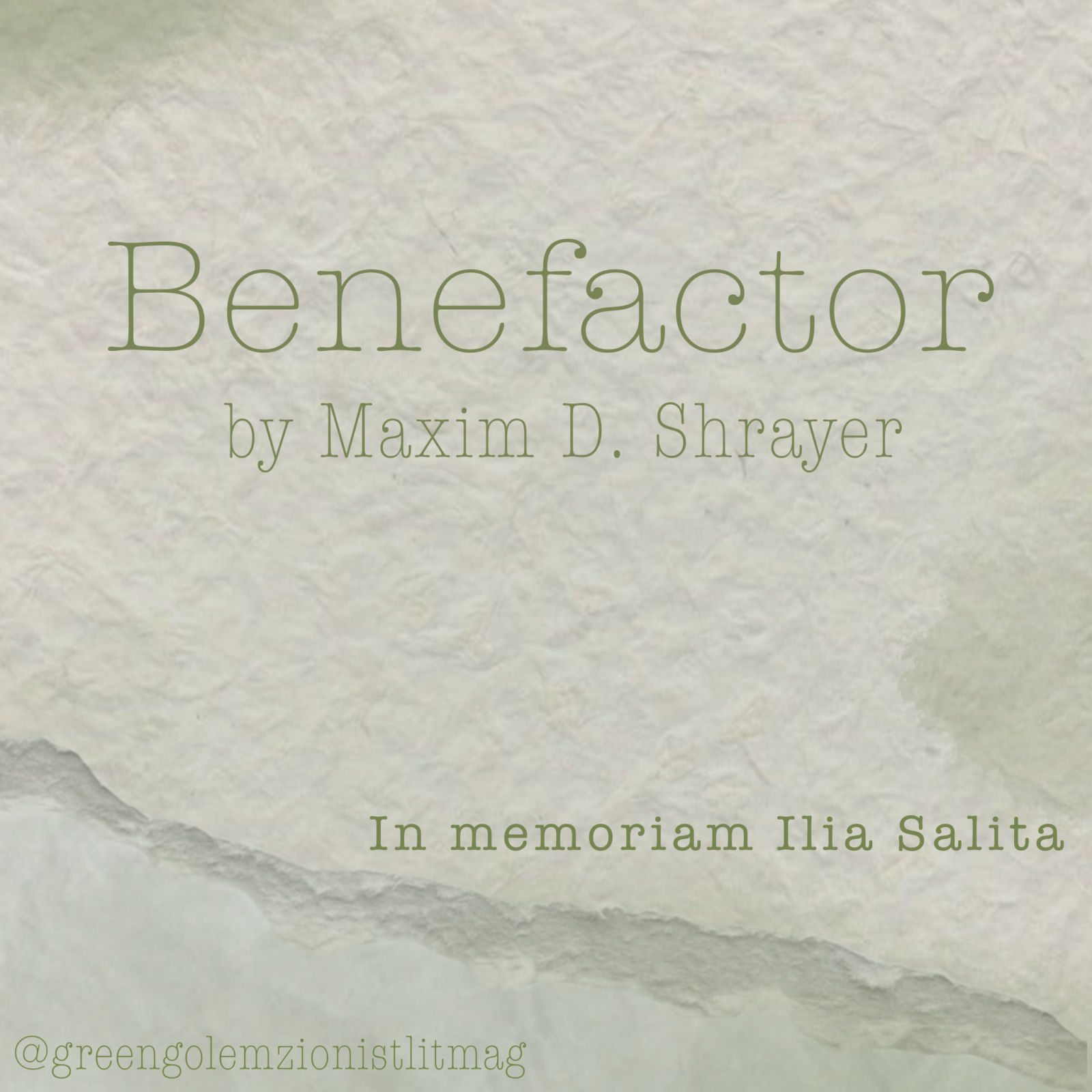Benefactor

Maxim D. Shrayer (shrayer.com) is a bilingual author and a…
Maxim D. Shrayer wrote “Benefactor” to memorialize the passing of his former classmate, Ilia Salita, the late CEO of Genesis Philanthropy Group. Ilia and Maxim were the only two Jews admitted to their school within Moscow University in 1984. In the words of the poet: “The poem is an attempt to reflect, mournfully, on our lost Jewish-Soviet youth in light of two wars, Russia’s invasion of Ukraine and Hamas’s attack on Israel.”
In memoriam Ilia Salita
Soundlessly you enter the most foreign of my dreams,
clutching under your left arm a cognac leather briefcase,
in which two choral synagogues would simultaneously fit.
You invite me to lecture before veterans of the great
patriotic war about any appropriate topic I didn’t make up,
for instance: Botvinnik’s chess, Oistrakh’s agile fingers,
Golda Meir’s endless cigarettes, Vasily Grossman’s lovers,
Trumpeldor’s last words, Moshe Kutuzov’s glass eye,
Brodsky’s salad-green Mercedes, Sergey Brin’s birthplace.
I agree on the spot. The terms, very lucrative: business class,
conference at Yad Vashem, survivors’ caustic whispers,
your baggy double-breasted suit, opening remarks about love.
We trade the usual pleasantries, wives and kids, the sun’s
already setting over Moscow or Boston, Tel-Aviv or Berlin.
Well, it all makes sense, you say in that coarse falsetto,
nonfiction, fiction, now a screenplay, surely you should do it,
we’ll support, but in the film Russian Jews must appear.
Perhaps, disappear? I make a joke. Wouldn’t it be great to write
a script about a Jewish Oblomov? In your eyes of a Moscow wunderkind
endless streams of heavy trucks flow on the Leningrad Highway.
The chocolate liquor of our Brezhnevian youth… In America we’ve grown
different. And yet, each time we meet, a hanging bridge ties itself
to our past, where alternative laws of gravitation and attraction rule, where
we walk from the sciences building to the main tower of Moscow State.
December outdoors. Sheepskin coat, fur hat, a vile mohair scarf,
for some reason you’re telling me, a poet’s son, about poets who
fought the Germans—Slutsky, Levitansky, Samoilov, Mezhirov, Vinokurov—
haven’t I seen them all in person, live at the Writers House?
But I wouldn’t include the last one, donut with dogshit as he was
(I repeat what I once heard as a kid on the train from Vilnius to Moscow
in a drunken conversation of littérateurs who translated from Lithuanian
into the language of the Empire, but that’s probably too hard
to interpret). Meanwhile you and I hurry to join a Jewish weightlifting club
under the direction of Robert Roman, son of a Latvian Rifleman. They accept
you but reject me. They reject you when I try to introduce you to my Beatles-
loving friends. They nominate you to join the school’s Komsomol committee,
and me, the son of refuseniks, they try to throw out of the university.
But now all of this has lost not only its meaning but also its form,
the perfumed smoke of our student years has long since lifted.
We sit at a table in a Greek pastry shop, you have only twenty
minutes before your next meeting. From your chest cavity you take out
three tablets at once: for notetaking, for headaches, and one more,
which resembles the one Moses was given, and also a hungry pelican,
and a watchman at an old Jewish cemetery. You look terribly tired,
in your cloudy eyes of a mortally wounded gazelle I see cascading
reflections: everything we once considered alien but loved the way
our people loved their rotgut, their Russian wives, their enemies.
Did you finish the screenplay? you ask me, slowly. Isn’t it about time?
I take a sip of my black coffee. I take a bite of my cheese Danish.
What can I tell you? Thank you, benefactor mine, but unfortunately
I cannot finish this script. Everything that we once shared, considered
our very own has become alien, and it no longer aches. You see,
benefactor, first the war on the land where our grandparents were born,
then another war on the land where we would like to find eternal rest.
What kind of a Jewish-Russian script can I compose today? What kind
of a funeral wailing song? Please forgive me, I just couldn’t let you down.
What's Your Reaction?
Maxim D. Shrayer (shrayer.com) is a bilingual author and a professor at Boston College. He was born in Moscow and emigrated in 1987. His recent books include A Russian Immigrant: Three Novellas and Immigrant Baggage, a memoir. Shrayer’s new collection of poetry, Kinship, is forthcoming in April 2024.













